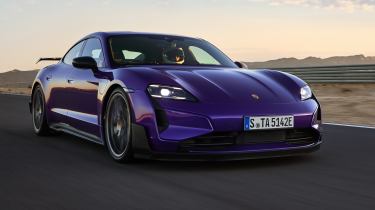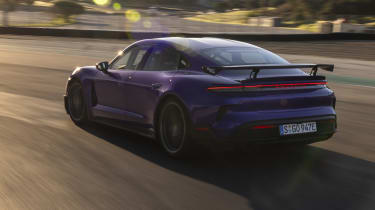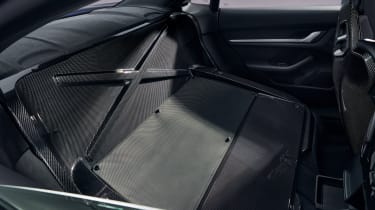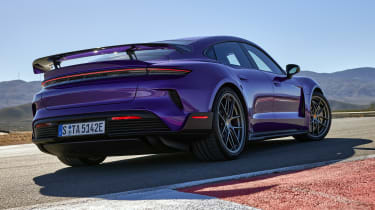1093bhp Porsche Taycan Turbo GT targets the Tesla Model S Plaid
The Taycan has received a track-focused makeover from Porsche’s GT division – the result is the most powerful production Porsche ever
After months of rumours and test mule sightings, Porsche has finally revealed its flagship electric car: the Taycan Turbo GT. Available in both GT and GT Weissach forms, the model has received a comprehensive mechanical overhaul, with significant upgrades to its powertrain, chassis and aerodynamics making it one of the fastest EVs on the market. Order books are open now in the UK with prices starting from £186,300.
Porsche made headlines earlier this year with a 7:07.55 lap of the Nürburgring in a Taycan Turbo GT prototype – while it was 2.25 seconds slower than the outright EV record holder, the Rimac Nevera, the Taycan gained the title of fastest four-door production EV by beating Tesla’s Model S Plaid. Porsche has now revealed that the model has broken another lap record at Laguna Seca, with a time of 1:27.87 making it the fastest production EV around the Californian circuit.
We now know where that astonishing performance comes from, with Porsche revealing the technical details behind the Taycan’s GT overhaul. Most significant is the increase in power, made possible through the use of a new 900 ampere ‘pulse inverter’ (the Turbo S stands at 600 amperes) and a more efficient semiconductor material in the rear axle motor. The result is a mind boggling 1093bhp peak output, making it the most powerful series-production Porsche ever sold.
As with most EVs, that peak power figure isn’t entirely what it seems. While both the Turbo GT and Turbo GT Weissach can output 1093bhp momentarily, they generate 778bhp for the rest of the time. With launch control selected the output rises to 1019bhp, with an Attack Mode – activated by pressing a button on the steering wheel or pulling the right paddle – providing a 161bhp power boost for 10 seconds. Peak torque stands at a ludicrous 988lb ft, prompting Porsche to reinforce the Taycan’s two-speed transmission while changing its gear ratios. For reference, the Taycan Turbo S produces 616bhp or 750bhp on overboost, with Tesla’s Model S Plaid extracting 1020bhp from its triple-motor setup.
Not only has Porsche drastically increased power output, it’s also turned its attention to weight. While the vast majority of an EVs heft lies within the drivetrain and battery package, Porsche has managed to trim out up to 75kg for the Turbo GT. To achieve this, the GT department has devised a (standard-fit) carbon ceramic brake package with lightweight caliper housings and disc chambers, while removing sound insulation, floor mats, soft close doors and using carbonfibre for the side skirts, mirrors and B-pillars. Standard Matrix LED headlights are fitted as standard due to their reduced weight, but HD Matrix items can be optioned at no cost.
The track-honed Turbo GT Weissach takes things a step further, adding lightweight glass, removing the dash-mounted Sports Chrono clock, the driver’s side charging port and even the rear interior speakers. The latter won’t bother passengers though, because there won’t be any in the rear – the Turbo GT Weissach swaps out the rear seats for a piece of carbonbfibre cladding.
The combination of this power increase, reduction in weight and the change to gear ratios has given the Turbo GT an impressive bump in performance. The 0-62mph sprint now happens a tenth or two quicker than the Turbo S at 2.2sec (2.3 for the non-Weissach), with the top speed now 180mph – or 190mph if you opt for the Weissach pack. Perhaps more impressive is the Weissach’s 6.4sec 0-124mph time, beating the Taycan Turbo S by 1.3sec.
Alongside the power increase, Porsche’s GT department has applied its industry-leading dynamic expertise to help the Taycan achieve those record lap times. As standard, both models come equipped with Porsche Active Ride suspension specifically tuned by the GT department, with sticky summer tyres and new lightweight 21-inch forged wheels also part of the package. Aerodynamics have also been honed for the track, with the standard Turbo GT receiving a new front splitter and an adaptive carbonfibre rear spoiler – the Weissach gets additional underbody air deflector elements, a more aggressive front splitter and a fixed rear wing for a 220kg peak downforce figure.
Given the 1093bhp powertrain and track-tuned setup, efficiency has taken a hit with the GT transformation, but the new model can still achieve a respectable 345 miles from a charge. Of course, your mileage will vary depending on driving style, weather conditions and whether you’re tackling your favourite B-road or Spa-Francorchamps…
Inside, lightweight Race-Tex and leather carbonfibre bucket seats come as standard, featuring ‘Turbo GT’ headrest embroidery. The steering wheel also gets the same treatment, covered in black Race-Tex material with a 12 o'clock marker. The Sports Chrono package comes as standard as in the Turbo S, with blue and silver trim available upon request. The Weissach package sees more of the same, only without the rear seats and with a Weissach logo on the passenger side of the dash.
The Turbo GT’s exterior design is surprisingly tame given its ludicrous performance, with only the new aero additions and more angular, aggressive bumpers setting it apart from its lesser Turbo siblings. A lower ride height, those new forged wheels and distinctive Victory Gold calipers help it stand out, though, and you certainly won’t miss it in its new Turbo Gt-specific blue and purple paint colours (available during the first year of production). The standard palette and Paint to Sample shades are also available to customers, with an optional decal set also on the menu.
The Porsche Taycan Turbo GT and Turbo GT Weissach are on sale in the UK now, with prices starting from £186,300 – £24,900 more than the Turbo S beneath it. The first examples are set to hit the road this spring.









